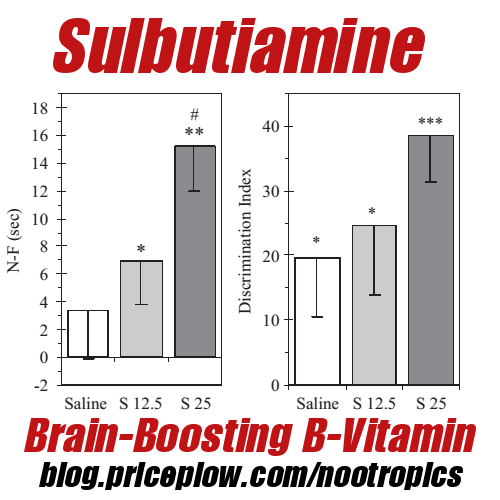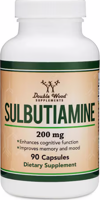Were you one of those kids in school who was fairly intelligent, but could never seem to get an A on your report card come end of semester? As in, you could easily get a B in a class, but hit a wall and came up just short of that A at final grade time?
Maybe instead of striving for an A this whole time, what you really needed was more B in your life -- vitamin B specifically!
Today, we're exploring Sulbutiamine, a powerful brain-boosting B vitamin that improves all aspects of learning, memory, and brain health!
What is Sulbutiamine?
Sulbutiamine is a synthetic form of the Thiamin (Vitamin B1) consisting of two Thiamin molecules bonded together. If you're familiar with Pyritinol, which is two Pyridoxine (Vitamin B6) molecules bonded together, then you get the idea behind Sulbutiamine.
Sulbutiamine is chemically known as isobutyryl thiamine disulfide and found under a number of other names, which we'll list further down. It's typically prescribed for treating "weakness" or Asthenia, as well as somatic and psychic inhibition.[1]
Watch our Sulbutiamine Review / Overview on YouTube!
If you don't feel like reading this entire guide, you can follow along with our video instead!
History of Sulbutiamine
Like many great inventions, Sulbutiamine was born out of a military research interest, more specifically, the Japanese navy.[2] Naval officers were battling Beriberi, a disease characterized by degenerative alterations in the Central Nervous System caused by a deficiency in Vitamin B1 (thiamin). It's known to affect many navies as well as numerous Asian countries, due to the reliance on white rice and lack of whole grains (which are fortified with all sorts of B vitamins).[3]
You might ask, why not just supplement with more of the natural Vitamin B1 to increase B levels in the body? The answer is that consuming thiamine (vitamin B1) doesn't actually do a whole lot, since it doesn't cross the blood-brain barrier, making it an inferior choice to increase brain thiamine levels, so Japanese researchers set out to tackle the task of creating a synthetic form of the vitamin which could cross the barrier and improve thiamine concentrations where it mattered in order to improve memory, minimize fatigue, and enhance wellness.[4].
Naval surgeon Takaka Kanehiro was the one who documented the relationship between the Japanese diet and wide spread occurrence of beriberi, which set him on his path to remedy the situation.[5] From here, the Japanese Vitamin B Research Committee immersed themselves in all things related to B VItamins (and their derivatives) until the successfully synthesized form of Thaimine in 1936, which came to be known as Sulbutiamine. Following that, the Japanese military used it to ward off occurrences of beriberi during World War II and has been heavily used since that time.
How It Works
![Sulbutiamine Glutaminergic Receptors: Effect of a chronic treatment by sulbutiamine on the density of glutamatergic and dopaminergic binding sites in various cerebral structures.<sup>[1]</sup>](https://blog.priceplow.com/wp-content/uploads/sulbutiamine-glutaminergic-receptors-300x625.png)
Sulbutiamine Glutaminergic Receptors: Effect of a chronic treatment by sulbutiamine on the density of glutamatergic and dopaminergic binding sites in various cerebral structures.[1]
The primary reason that sulbutiamine is more effective at increasing brain levels of thiamine, is that it is a fat-soluble form of thiamine, as opposed to Vitamin B1 which is water soluble. Therefore, transportation into the brain is easier for sulbutiamine than thiamine due to its lipophilicity ("fat solubility").[6] In other words, sulbutiamine's unique structure essentially "tricks" the brain into letting it in, where it can then get to work increasing thiamine and thiamine phosphate levels inside.
Sulbutiamine is known to act on the cholinergic, glutaminergic, and dopaminergic systems of the brain[1; 4], which is the reason it offers so many nootropic qualities. It potentiates glutamatergic activity in the prefrontal cortex, and increases cholinergic activity in the Hippocampus, which is one of the primary reasons it positively affects cognition and memory. This increased cholinergic activity essential means more acetylcholine is produced, which is important, as acetylcholine plays a key role in synaptic plasticity, learning, and memory, and is vital for long term memories.[7]
While sulbutiamine increases both cholinergic and glutaminergic transmissions, the manner in which the synthetic B Vitamin interacts with dopamine is a bit different. Sulbutiamine uses an MOA very different from your typical dopamine-boosting supplements. The nootropic actually reduces the release of dopamine in the prefrontal cortex, and when this happens, the amount of dopamine receptors increases in response to the reduced dopamine levels.[7]
So although the amount of dopamine is reduced, the amount of dopamine receptors is increased, and makes the body more sensitive to any dopamine that's subsequently released.[8] This effect makes it quite popular in stacking agents with other nootropics (especially those that can boost dopamine themselves), as we'll explore in our stack section lower down.
Benefits of Sulbutiamine
-
Increase Thiamin Levels
![Effect of an acute administration of sulbutiamine (12.5 mg/kg, (i.p.)) on the density of D1 and D2 dopaminergic and kainate binding sites in the cingular and prefrontal cortex.<sup>[1]</sup>](https://blog.priceplow.com/wp-content/uploads/sulbutiamine-dopamine-receptor-density-300x305.png)
Effect of an acute administration of sulbutiamine (12.5 mg/kg, (i.p.)) on the density of D1 and D2 dopaminergic and kainate binding sites in the cingular and prefrontal cortex.[1]
While this may seem obvious for a benefit, the primary benefit from sulbutiamine use is that it increases brain levels of thiamine. More specifically, it's roughly 2.4x more effective at boosting brain levels of B1 than regular old thiamin you'd find in a multi-vitamin.[6] Thiamine is an essential nutrient that the brain needs to stave off fatigue (from small deficiencies) all the way to beriberi (from large deficiencies).
-
Improves Memory
Several studies have shown that sulbutiamine is effective for improving memory retention and mental performance.[4,9] These studies included both long term memory and object-recognition tests.
-
Neuroprotection
Sulbutiamine may also preserve brain health by strengthening the health of brain synapses. One of the problems caused by thiamin deficiency is the disruption of synaptic transmission. However, sulbutiamine, via increasing thiamin levels, preserves the health and function of synapses, and their connections.[10]
-
Reduces Fatigue
![Effect of sulbutiamine on memory performance -- note the vast improvements in Sulbutiamine (S) over control of saline.<sup>[9]</sup>](https://blog.priceplow.com/wp-content/uploads/sulbutiamine-memory-300x278.png)
Effect of sulbutiamine on memory performance -- note the vast improvements in Sulbutiamine (S) over control of saline.[9]
One of the hallmark signs of thiamin deficiency is fatigue. Seeing as sulbutiamine is an effective elevator of thiamin in the body, it makes perfect sense that the synthetic B vitamin can combat one of the biggest problems from low thiamine levels.
A research study had subjects consume either placebo, 400mg, or 600mg of sulbutiamine for 4 weeks and gauge its effects on chronic postinfectious fatigue (CPIF). Researchers noted that both the 400 and 600mg doses of sulbutiamine significantly reduced fatigue compared to placebo, but there was no discernable difference between the two dosing groups.[11]
There are countless things that can cause fatigue, so don't immediately assume thiamine deficiency is the problem. But if you've explored other options or are just trying to throw the kitchen sink at your fatigue problem, this nootropic vitamin is definitely worth testing.
-
Increased Wakefulness
Like many other nootropics, Sulbutiamine does enhance one's wakefulness[12], though not to the extent of a prescription drug like Moda. Still, we'd suggest not taking it too close to bedtime as it could affect sleep - consider this more of a "breakfast vitamin".
-
Prevents Neuronal Cell Death
![Sulbutiamine ROS: Radical scavenging capabilities of sulbutiamine against various reactive species.<sup>[14]</sup>](https://blog.priceplow.com/wp-content/uploads/sulbutiamine-ros-300x707.png)
Sulbutiamine ROS: Radical scavenging capabilities of sulbutiamine against various reactive species.[14]
Trophic factors are "helper" molecules that enable a neuron to develop and maintain connections with its neighboring neurons. Research has shown that when neurons are deprived of the these trophic factors, it induces apoptosis, otherwise known as "programmed cell death."[13]
However, in vitro studies have shown that sulbutiamine is able to attenuate neuronal cell death of these deprived neurons in cultures.[14]
As a side note, if this is a concern of yours (ie you're here researching compounds that prevent cell death), consider also Huperzine A in your supplement stack.
Other Benefits of Sulbutiamine
Sulbutiamine is more than just a powerful nootropic, it's been used for a number of other conditions too:
-
Treats Erectile Dysfunction
One piece of research demonstrated that sulbutiamine successfully treated erectile dysfunction (ED) in 16 male subjects (out of 20 total) over the course of 30 days - quite a nice success rate!
Some of the participants even had arterial disorders, which could inhibit blood flow to your most important parts, thereby stunting your erections. However, sulbutiamine was even found to be effective in these men as well, giving evidence that these B-vitamins have power beyond the brain.[15]
-
Combats Depression
Sulbutiamine has also been shown to be an effective alternative to pharmaceutical drugs in combating symptoms of various psychobehavioral conditions such as depression and even shyness (and possibly social anxiety). While Sulbutiamine is not in and of itself an "antidepressant", researchers concluded it can be helpful in rehabilitating those suffering from depression.[16]
-
Battles Alzheimer's
In one double-blind trial, Sulbutiamine was found to be an acceptable treatment for Alzheimer's Disease due to its potentiation of glutamatergic and cholinergic transmissions in the Hippocampus and Prefrontal Cortex compared to donepezil (a commonly prescribed drug for Alzheimer's), and a placebo.[17]
Dosing
![Sulbutiamine Sports: Sulbutiamine is even making its way into sports! Here's a chart from a study analyzing 16,000 samples of athletes across a wide number of sports.<sup>[19]</sup>](https://blog.priceplow.com/wp-content/uploads/sulbutiamine-sports-300x358.png)
Sulbutiamine Sports: Sulbutiamine is even making its way into sports! Here's a chart from a study analyzing 16,000 samples of athletes across a wide number of sports.[19]
Most Sulbutiamine products come in 100 or 200mg capsules for ease of dosing, but there are a few aggressive ones at 500mg per capsule. In addition, there are some powders on the market, at which point you should definitely buy yourself a precision scale that can measure down to the milligram.
As mentioned before, due to it being "psychostimulatory" in effect, take doses with breakfast and lunch - not dinner!
Note: If you have a diet high in whole grains (which is rich in B vitamins) you may not need as much sulbutiamine as someone whose diet is rich in say white rice, and would need a higher dose due to lower levels of B vitamins in their body.
It's always important to supplement based upon your diet, so start tracking your typical week's dietary intake and look at where your micronutrients, macronutrients, and minerals land, and supplement around your deficiencies first and foremost.
Side Effects
Side effects of sulbutiamine are rare, but there was one study that found that it possibly led to "addictive tendencies" in a bipolar individual.[18] But... it's important to note though that the individual was using high dose antipsychotics including olanzapine and haloperidol at 20mg, the diazepam and temazepam at 40mg and 10mg, 10mg biperiden, and unknown doses of cabamazepine and lithium.
All of that was in addition to sulbutiamine doses above 600mg. With so many pharmaceuticals involved in that case, it's impossible to pin the issue on the B-vitamin of all things, so this study may not be the most relevant to you out there reading this - but it still must be mentioned.
Some users have reported jitters and / or anxiety when taking too much sulbutiamine at once. Remember, the nootropic can be psychostimulatory, so it may possibly cause insomnia if you take it too close to bedtime.
Sulbutiamine Stacking
Your stack is ultimately going to depend on what your intended effects are:
- If you're looking for straight focus, sulbutiamine is frequently stacked alongside racetams, aniracetam in particular for the purpose of stress relief (see below). It's also commonly stacked with high-quality containing choline-containing compounds like Citicoline or Alpha GPC.
- Those wanting to attack the neuron cell death issue should consider adding Huperzine A, as well as the cholinergenics like citicoline and alpha GPC linked above.
- Those looking into the anti-depressive / social anxiety reducing effects may enjoy small doses alongside L-Theanine. Aniracetam mentioned above also has anxiolytic properties. There are dozens of compounds that could be tried, just don't try them all at once.
- If you're looking for aggressive weight loss and appetite suppression, the popular Synadrene fat burner already has a solid dose.
Like most nootropics, sulbutiamine is used in conjunction with caffeine for added energy and focus boost, and to really enhance sulbutiamine's wakefulness-promoting properties.
There are several ways Sulbutiamine can be incorporated into a brain-boosting stack, it may just take some personal experimentation to find your own sweet spot.
Takeaway
Sulbutiamine is an incredibly powerful vitamin that not only improves health and wards off disease, but also offers a wide range of brain-boosting benefits, especially in the areas of memory and mental performance. This is a nootropic that should be known and at least tested by certain individuals, especially those dealing with indecipherable fatigue problems.
For those who aren't fatigued but are just looking for added focus, it's worth trying - every now and then it's fun to mix up the nootropic stack and toss in a new player to see if you can enhance cognitive function and energy levels even more.
Sulbutiamine represents a safe and effective alternative to the aggressive nootropics you've been seeing online, but its originally intended effects of preventing B-deficiency related problems are still just as valid as ever.
Thank you for reading our article! Please leave feedback or hit us up on social media!References
- Trovero F, et al. Evidence for a modulatory effect of sulbutiamine on glutamatergic and dopaminergic cortical transmissions in the rat brain. Neurosci Lett. (2000) https://pubmed.ncbi.nlm.nih.gov/10996447
- Inouye K, Katsura E. Etiology and pathology of beriberi. In: Shimazono N, Katsura E, editors. Beriberi and Thiamine. Tokyo: Igaku Shoin Ltd; 1965. pp. 1–28.
- VEDDER EB. THE PATHOLOGY OF BERIBERI. JAMA. 1938;110(12):893-896. doi:10.1001/jama.1938.62790120007009. https://jamanetwork.com/journals/jama/article-abstract/280466
- Micheau J, Durkin TP, Destrade C, Rolland Y, Jaffard R. Chronic administration of sulbutiamine improves long term memory formation in mice: possible cholinergic mediation. Pharmacol Biochem Behav. 1985;23(2):195-198. https://pubmed.ncbi.nlm.nih.gov/4059305
- Lonsdale D. A Review of the Biochemistry, Metabolism and Clinical Benefits of Thiamin(e) and Its Derivatives. Evidence-based Complementary and Alternative Medicine. 2006;3(1):49-59. doi:10.1093/ecam/nek009. https://www.ncbi.nlm.nih.gov/pmc/articles/PMC1375232/
- Bettendorff L, Weekers L, Wins P, Schoffeniels E. Injection of sulbutiamine induces an increase in thiamine triphosphate in rat tissues. Biochem Pharmacol. 1990;40(11):2557-2560. https://pubmed.ncbi.nlm.nih.gov/2268373
- Mitsushima, D. et al. A cholinergic trigger drives learning-induced plasticity at hippocampal synapses. Nat. Commun. 4:2760 doi: 10.1038/ncomms3760 (2013). https://www.nature.com/articles/ncomms3760
- Hong S. Dopamine system: manager of neural pathways. Frontiers in Human Neuroscience. 2013;7:854. doi:10.3389/fnhum.2013.00854. https://www.ncbi.nlm.nih.gov/pmc/articles/PMC3856400/
- Bizot J-C, Herpin A, Pothion S, Pirot S, Trovero F, Ollat H. Chronic treatment with sulbutiamine improves memory in an object recognition task and reduces some amnesic effects of dizocilpine in a spatial delayed-non-match-to-sample task. Prog Neuropsychopharmacol Biol Psychiatry. 2005;29(6):928-935. doi:10.1016/j.pnpbp.2005.04.035. https://pubmed.ncbi.nlm.nih.gov/15951087
- Tanabe M, Nitta A, Ono H. Neuroprotection via strychnine-sensitive glycine receptors during post-ischemic recovery of excitatory synaptic transmission in the hippocampus. J Pharmacol Sci. 2010;113(4):378-386. https://pubmed.ncbi.nlm.nih.gov/20668364
- Tiev KP, Cabane J, Imbert JC. [Treatment of chronic postinfectious fatigue: randomized double-blind study of two doses of sulbutiamine (400-600 mg/day) versus placebo]. La Rev Med interne. 1999;20(10):912-918. https://pubmed.ncbi.nlm.nih.gov/10573727
- Balzamo E, Vuillon-Cacciuttolo G. Facilitation of a state of wakefulness by semi-chronic treatment with sulbutiamin (Arcalion) in Macaca mulatta]. Rev Electroencephalogr Neurophysiol Clin. 1982;12(4):373-378. https://pubmed.ncbi.nlm.nih.gov/7170385
- Rich KM. Neuronal death after trophic factor deprivation. J Neurotrauma. 1992;9 Suppl 1:S61-9. https://pubmed.ncbi.nlm.nih.gov/1316971
- Kang KD, Majid ASA, Kim K-A, et al. Sulbutiamine counteracts trophic factor deprivation induced apoptotic cell death in transformed retinal ganglion cells. Neurochem Res. 2010;35(11):1828-1839. doi:10.1007/s11064-010-0249-5. https://pubmed.ncbi.nlm.nih.gov/20809085
- Dmitriev DG, Gamidov SI, Permiakova O V. Clinical efficacy of the drug enerion in the treatment of patients with psychogenic (functional) erectile dysfunction. Urologiia. 2005;(1):32-35. https://pubmed.ncbi.nlm.nih.gov/15776829
- Effects of sulbutiamine (Arcalion 200) on psycho-behavioral inhibition in major depressive episodes]. Encephale. 2000;26(2):70-75. https://pubmed.ncbi.nlm.nih.gov/10858919
- Ollat H, Laurent B, Bakchine S, Michel B-F, Touchon J, Dubois B. Effects of the association of sulbutiamine with an acetylcholinesterase inhibitor in early stage and moderate Alzheimer disease. Encephale. 2007;33(2):211-215. https://pubmed.ncbi.nlm.nih.gov/17675917
- Douzenis A, Michopoulos I, Lykouras L. Sulbutiamine, an "innocent" over the counter drug, interferes with therapeutic outcome of bipolar disorder. World J Biol Psychiatry. 2006;7(3):183-185. doi:10.1080/15622970500492616. https://pubmed.ncbi.nlm.nih.gov/16861144
- Sobolevsky T, Rodchenkov G. Sulbutiamine in sports. Drug Test Anal. 2010;2(11-12):643-646. doi:10.1002/dta.183. https://pubmed.ncbi.nlm.nih.gov/21204296
Sulbutiamine News on PricePlow
-
Aug 04, 2017 
YouTube Video
Sulbutiamine -- What is it and What does it do?!
Sign up for future Sulbutiamine news!
Click the button below to sign up for future Sulbutiamine news, deals, coupons, and reviews!
Sulbutiamine Reviews & Videos
-
Aug 04, 2017Sulbutiamine -- What is it and What does it do?!
Subscribe for more Sulbutiamine news and alerts!
Subscribe to PricePlow on YouTube, follow PricePlow on Instagram or click the button below to sign up for our latest Sulbutiamine news and reviews!




